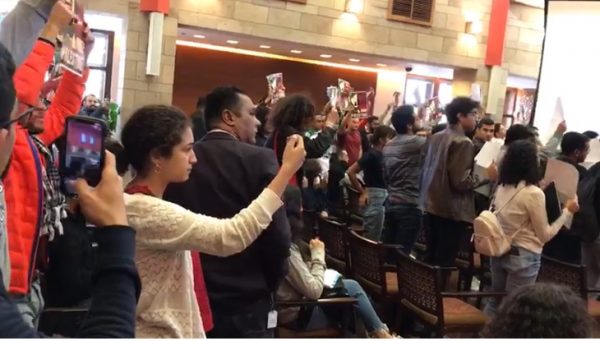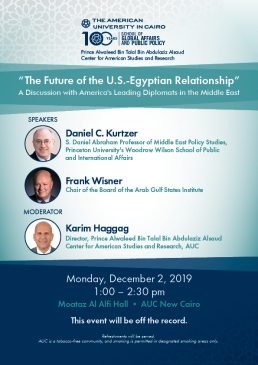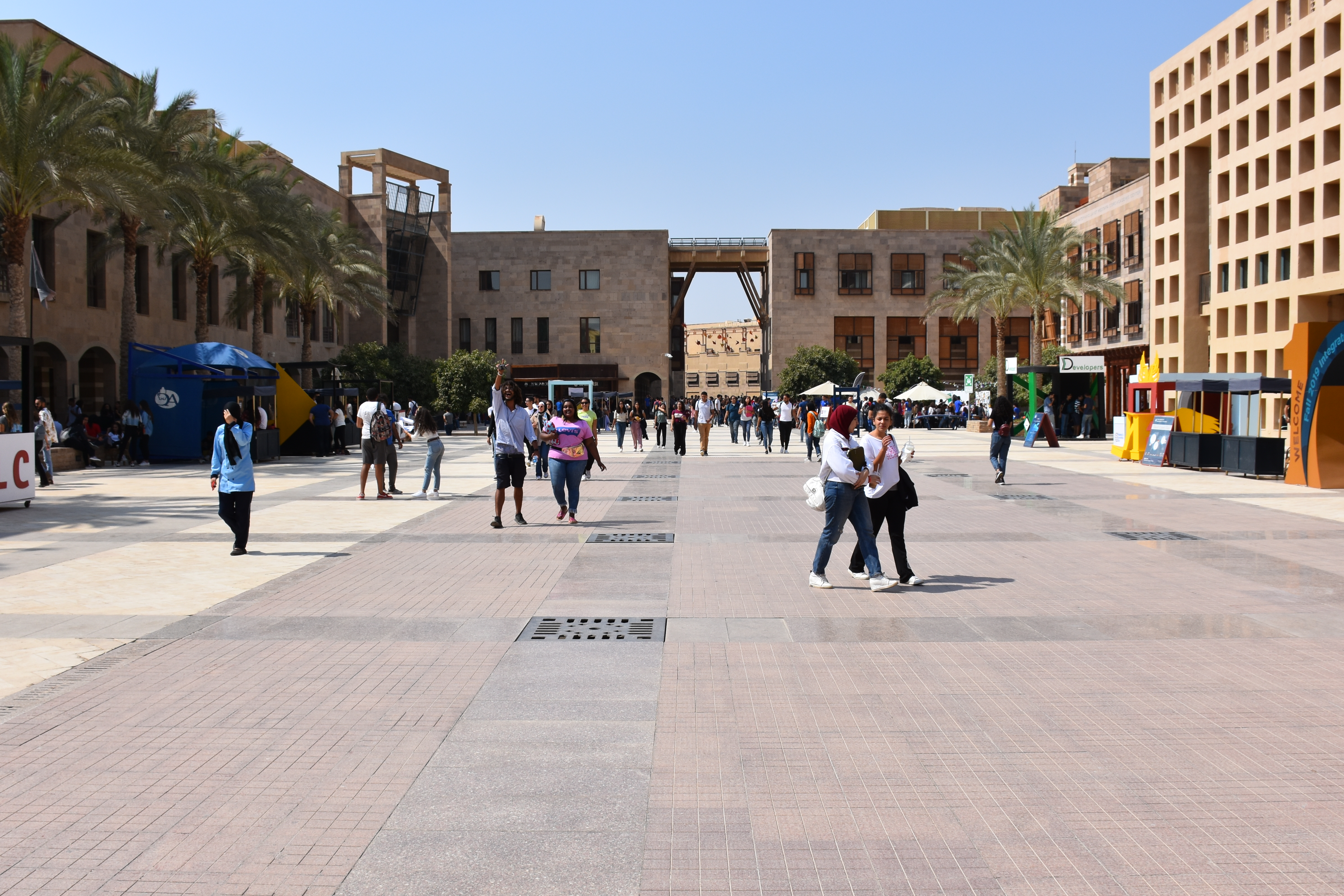US Middle East Policy Needs to Change, Former Ambassadors say
Former US ambassadors to Egypt Daniel Kurtzer and Frank Wisner told The Caravan that current US Middle East policy has made prospects of working toward a peace settlement between the Israelis and Palestinians more complicated.
“I don’t see a role for the US right now under [US President Donald] Trump, under the conditions that we’ve established with a one-sided approach toward Israel,” Wisner told The Caravan.
The two former State Department officials were at AUC to deliver a talk on “The Future of the US Egyptian Relationship” organized by the Center for American Studies and Research (CASAR).
“I don’t see us opening a dialogue; no outcome can be reached without the Palestinians and I don’t see it happening,” he added.
He said that either the situation on the ground should change or American politics have to change for there to be a path forward.
“Until there is a practical avenue for engagement, we’re not going to matter.”
When asked if the two-state solution of two countries Israel and Palestine living side by side was still an option, Wisner said neither side today, particularly the Israelis, are ready to engage on those practicalities.
“I don’t think the US is in a position to bring the parties to the table…I don’t see the mood, the environment, conducive to engage in a negotiation,” he said.
The Caravan asked the ambassadors about Israel’s siege on Gaza, and whether its disproportionate response to home-made rockets fired from the territory into Israeli towns was justified.
Both ambassadors said Israel had a right to self-defence.
“The issue is one of politics, how do you get both sides to calm down to treat each other in a manner that advances the prospects of a political settlement so that they’re not sending rockets or dropping bombs,” Wisner said.
“We’re not there [a peace settlement] yet, we’re a long ways away.”
In the meantime, the siege on Gaza continues with Palestinians being killed by Israeli forces. On November 30, a teen demonstrating against the occupation was shot and killed by Israeli soldiers. Two days earlier, Israel said it had intercepted and shot down two homemade rockets fired from Gaza.
Despite the violence, both Hamas – the Islamist resistance group running Gaza, and the Israelis are holding indirect talks toward a long-term agreement, the Israeli press reports. Israel’s top military office Aviv Kohavi believes that a long-term ceasefire is within sight.
A Hamas delegation is expected in Egypt, which acts as a mediator in the talks.
Kurtzer said he believes there needs to be a policy change regarding the humanitarian situation in Gaza.
“The humanitarian crisis in Gaza requires change in policy by both Israel and Egypt,” Kurtzer said.
“Both countries control access to Gaza … both have a responsibility to figure out a way to relieve the humanitarian crisis,” he added. The blockade of Gaza has been in place since 2007.
Tuesday was the second day of the ambassadors’ visit at AUC.
On December 2, during their assembly hour panel on US foreign policy in the Middle East, students walked out at the beginning of the talk holding flyers with “Zionists are not welcome here” and “Free Palestine” written on them as they chanted anti-Israel slogans
The ambassadors said that they had wished to engage with AUC students about the Trump administration’s Middle East policy during the talk.
“I did hear that they would be in the auditorium,” Wisner said, “and that they would be making a statement, so I wasn’t surprised.”
He went on to say that he appreciated the students expressing their right to speak and deliberating their message “from the heart and springs from the reality” of the situation in the Middle East but regretted that students left the auditorium without waiting to hear what the ambassadors had to say.
“They left the room … they didn’t ask us any questions. If they stayed they could have asked Dan [Kurtzer] who is a real expert in negotiations between the United States and the Palestinians and the Israelis,” Wisner said.
The student walkout was organized by the Student Union, Student Rights Coalition, individuals from political camps, student clubs and various major associations, according to Ahmad Mahana, a political science senior.
Mahana was one of the students who took part in organizing and leading the walkout.
“On a personal level, I wanted to be heard. I wanted students to be heard… the university does offer us a platform to speak. We can say what we want to a certain extent. For me, this was an important political stance to share our opinions since the opportunity was there. This is especially when we find a situation that we do not like,” Mahana said.
Kurtzer said he was “very happy” that the students demonstrated because they were exercising their right to freedom of speech.
“They [the students] had very strong views and they made their views known,” he said.
“But why didn’t they stay and ask us tough questions or make a tough statement?”
Kurtzer indicated that an opportunity for dialogue and engagement had been squandered.
Mahana said that one group of students wanted to stay and another wanted to ask the ambassadors questions, but that a third group wanted to walkout immediately.
“We would have listened to them and they could have listened to us. At the end, maybe they would be persuaded or maybe they wouldn’t maybe I would be persuaded or maybe not,” Kurtzer said.
Mahana said he was unconvinced. “Questions open up discussion and I don’t want to give them [the ambassadors] space to talk. They have all the space to talk,” Mahana said.
When asked by the moderator Professor Karim El Haggag to stay and debate the ambassadors, some students responded that they do not talk to Zionists or the oppressor.
“I didn’t want in any way for them to turn the table on us. This was not the conversation we are trying to have. I don’t want them to be heard. I wanted students to be heard… Giving this sort of conversation is a respect that I don’t think they deserved,” Mahana told The Caravan.
Both ambassadors said they found that particular student response as they walked out of the talk unwarranted and not very mature.
When The Caravan raised the issue of US policy empowering Israel, Kurtzer called on students to engage and question him.
“I’m an American citizen, I was an American ambassador, I teach at an American university… argue with me about American policy. It may be convincing and it may not be.”
Reporting by Noran Alaa, Basant Samhout and Mohamed Youssef





